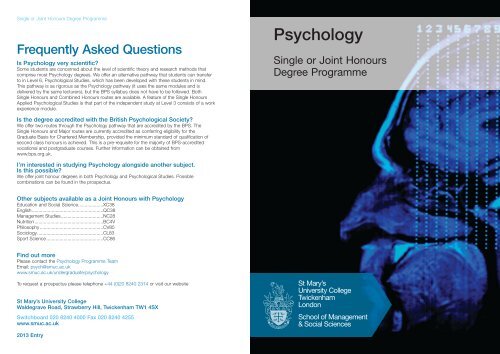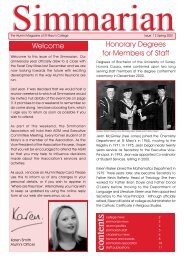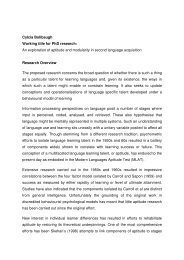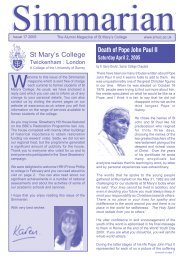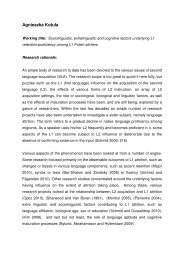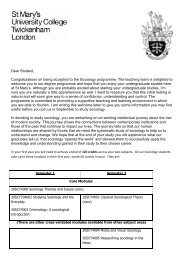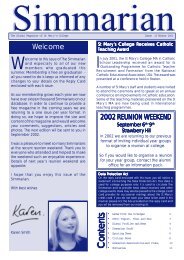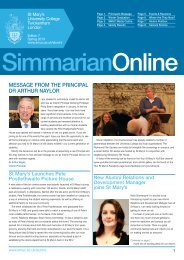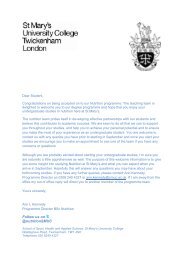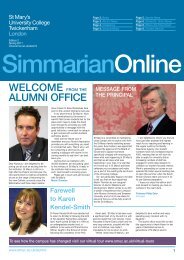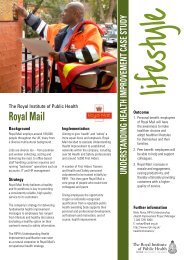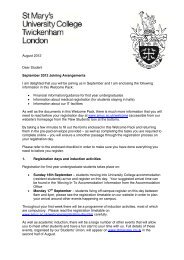Course Leaflet - St Mary's University College
Course Leaflet - St Mary's University College
Course Leaflet - St Mary's University College
You also want an ePaper? Increase the reach of your titles
YUMPU automatically turns print PDFs into web optimized ePapers that Google loves.
Single or Joint Honours Degree Programme<br />
Frequently Asked Questions<br />
Is Psychology very scientific?<br />
Some students are concerned about the level of scientific theory and research methods that<br />
comprise most Psychology degrees. We offer an alternative pathway that students can transfer<br />
to in Level 6, Psychological <strong>St</strong>udies, which has been developed with these students in mind.<br />
This pathway is as rigorous as the Psychology pathway (it uses the same modules and is<br />
delivered by the same lecturers), but the BPS syllabus does not have to be followed. Both<br />
Single Honours and Combined Honours routes are available. A feature of the Single Honours<br />
Applied Psychological <strong>St</strong>udies is that part of the independent study at Level 3 consists of a work<br />
experience module.<br />
Psychology<br />
Single or Joint Honours<br />
Degree Programme<br />
Is the degree accredited with the British Psychological Society?<br />
We offer two routes through the Psychology pathway that are accredited by the BPS. The<br />
Single Honours and Major routes are currently accredited as conferring eligibility for the<br />
Graduate Basis for Chartered Membership, provided the minimum standard of qualification of<br />
second class honours is achieved. This is a pre-requisite for the majority of BPS-accredited<br />
vocational and postgraduate courses. Further information can be obtained from<br />
www.bps.org.uk.<br />
I’m interested in studying Psychology alongside another subject.<br />
Is this possible?<br />
We offer joint honour degrees in both Psychology and Psychological <strong>St</strong>udies. Possible<br />
combinations can be found in the prospectus.<br />
Other subjects available as a Joint Honours with Psychology<br />
Education and Social Science...................XC38<br />
English......................................................QC38<br />
Management <strong>St</strong>udies................................NC28<br />
Nutrition....................................................BC4V<br />
Philosophy ................................................CV85<br />
Sociology..................................................CL83<br />
Sport Science...........................................CC86<br />
Find out more<br />
Please contact the Psychology Programme Team<br />
Email: psych@smuc.ac.uk<br />
www.smuc.ac.uk/undergraduate/psychology<br />
To request a prospectus please telephone +44 (0)20 8240 2314 or visit our website<br />
<strong>St</strong> Mary’s <strong>University</strong> <strong>College</strong><br />
Waldegrave Road, <strong>St</strong>rawberry Hill, Twickenham TW1 4SX<br />
Switchboard 020 8240 4000 Fax 020 8240 4255<br />
www.smuc.ac.uk<br />
2013 Entry<br />
<strong>St</strong> Mary’s<br />
<strong>University</strong> <strong>College</strong><br />
Twickenham<br />
London<br />
School of Management<br />
& Social Sciences
Single or Joint Honours Degree Programme<br />
<strong>St</strong> Mary’s <strong>University</strong> <strong>College</strong><br />
Twickenham London<br />
Psychology<br />
Psychology<br />
Psychology is the scientific study of<br />
human experience, including behaviour,<br />
mental processes, emotions and<br />
development.<br />
The Psychology degree at <strong>St</strong> Mary’s provides<br />
you with a scientific understanding of mind,<br />
brain and behaviour. Alongside the academic<br />
content of the programme you will gain<br />
transferable skills, including the capacity for<br />
self-directed, reflective learning and project<br />
management.<br />
The Psychology Degree at <strong>St</strong> Mary’s provides a<br />
BPS accredited route. Graduation through the<br />
accredited route confers eligibility for the<br />
Graduate Basis for Chartership with the British<br />
Psychological Society provided the minimum<br />
qualification of second class honours is<br />
achieved. We also provide non-accredited<br />
routes, which may be of particular interest to<br />
students wishing to read for a Joint Honours<br />
Degree.<br />
The staff is research active, and their work<br />
covers areas such as the psychological effects<br />
of brain damage, attentional biases associated<br />
with anxiety, integrational relationships within<br />
the family context, and factors and perceptions<br />
in social inequality.<br />
Entry Requirements<br />
A minimum of 260 points of which 180 must<br />
include a B and a C grade at A level.<br />
Remaining points can be made up of A level or<br />
AS level grades including General <strong>St</strong>udies.<br />
Grade C or above in English and Maths or<br />
equivalent. Alternative qualifications welcome.<br />
Programme <strong>St</strong>ructure and Content<br />
Level 4<br />
The focus of Level 4 is on understanding how a<br />
contemporary psychologist (as opposed to the<br />
psychologist portrayed in the media) thinks<br />
about and investigates central questions of<br />
interest. <strong>St</strong>udents complete six modules during<br />
their first year. <strong>St</strong>udents complete six modules<br />
during their first year. Alongside your knowledge<br />
of the subject, you will also be acquiring and<br />
practising academic skills that will underpin your<br />
studies at Levels 5 and 6.<br />
Level 5<br />
You will build on the skills and knowledge you<br />
developed during Level 4. Your second and third<br />
year will be based around the core themes of<br />
the BPS syllabus: Research Methods, Cognitive<br />
Psychology, Psychobiology, Social Psychology,<br />
Developmental Psychology and Individual<br />
Differences. Conceptual and historical issues will<br />
give context and background to current<br />
understanding.<br />
Level 6<br />
You are now considering the perspectives and<br />
themes that have been introduced at an<br />
advanced level, and in considerable depth. You<br />
are beginning to question the limits of our<br />
knowledge and understanding, and show an<br />
appreciation for the temporary nature of scientific<br />
knowledge. You are advancing your<br />
understanding of the relationship between<br />
empirical evidence and theory; in particular, how<br />
empirical evidence supports and constrains<br />
theories, and how theories guide the collection<br />
and interpretation of empirical data. Optional<br />
modules, including workplace learning modules,<br />
will be available. Possible examples include<br />
Positive Psychology, Political Psychology, Human<br />
Relationships, Health Psychology, Educational<br />
Psychology, Eyewitness Testimony,<br />
Consciousness and Applied Child Psychology.<br />
<strong>St</strong>udents wishing to graduate with a BPS<br />
accredited course will complete an Empirical<br />
Research Project in a psychology or psychologyrelated<br />
topic. This is an opportunity to carry out<br />
original research in an area of your choosing.<br />
Although closely supervised by a member of staff,<br />
this is very much the students’ own work.<br />
<strong>St</strong>udents wishing to graduate through the nonaccredited<br />
route will complete a library-based<br />
piece of research in an area of their own<br />
choosing, supervised by a member of staff.<br />
Teaching methods<br />
Our aim is to help you develop as an independent<br />
thinker, able to work individually and in a team,<br />
and capable of managing your workload.<br />
Innovative teaching methods are delivered within<br />
traditional settings such as lectures and seminars,<br />
or within more contemporary settings such as<br />
virtual learning environments. You will also engage<br />
in workshops and practical tasks that develop<br />
your research skills.<br />
Assessment methods<br />
<strong>Course</strong>s are assessed through a variety of<br />
methods including examinations, presentations,<br />
essays, research, practical reports and case<br />
studies.<br />
Career opportunities<br />
<strong>St</strong>udents can undertake further study in<br />
education, clinical research, sport, health or<br />
occupational fields, subsequent to them being<br />
awarded Graduate Basis for Chartered<br />
Membership with the British Psychological<br />
Society. The knowledge and skills acquired during<br />
the degree are very marketable and can enhance<br />
job prospects in almost any career option.<br />
“Because of the wide range of generic skills and<br />
the rigour with which they are taught, training in<br />
psychology is widely accepted as providing an<br />
excellent preparation for a number of careers.”<br />
The Council for Industry and Higher Education<br />
“Psychology is well structured, the lecturers are<br />
helpful and I enjoy the different teaching methods<br />
and modules available. Lecturers have made the<br />
effort to get to know the students, and are<br />
committed to helping the students reach their<br />
goals. I found the experience beneficial and<br />
rewarding and it has made me more determined<br />
to go into my chosen path of psychology.”<br />
Cherelle Francis<br />
Psychology


